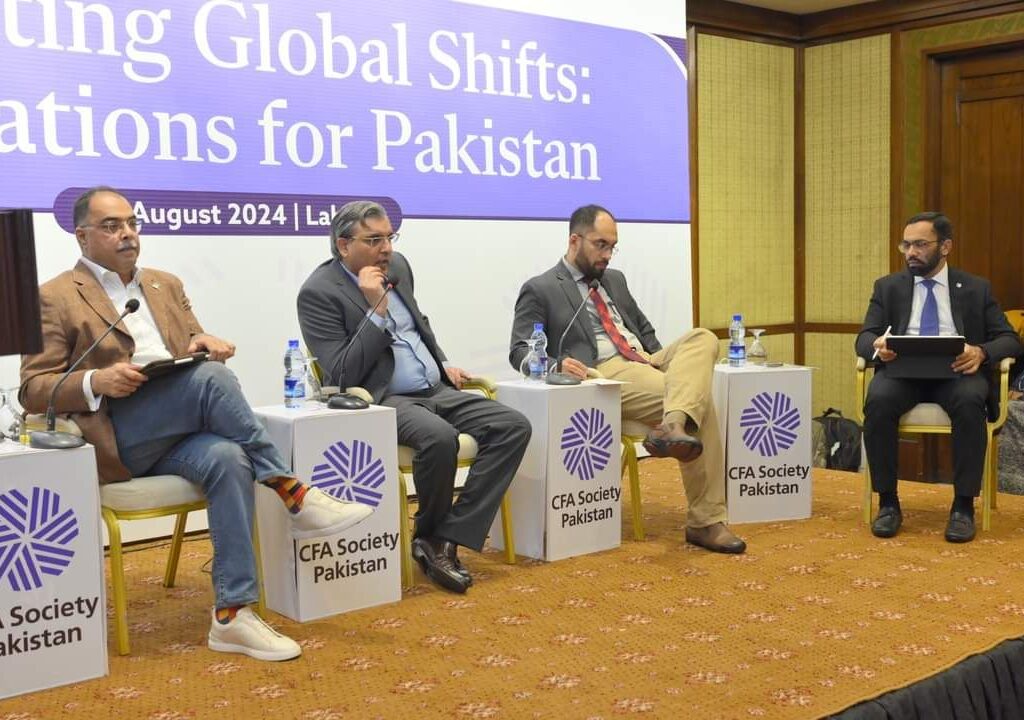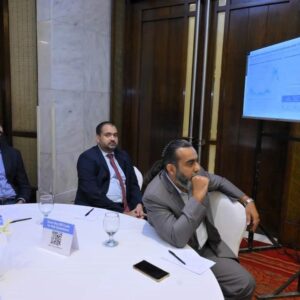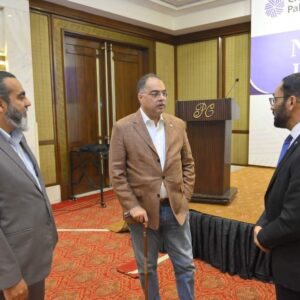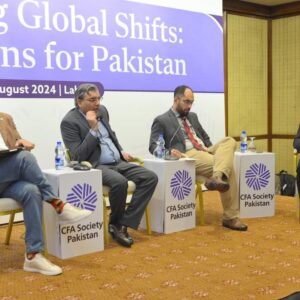CFA Society Pakistan is hosting ‘Navigating Global Shifts – Implications for Pakistan.
This seminar in CFA Society Pakistan; ‘Navigating Global Shifts – Implications for Pakistan is moderated by Mr. Mohammad Shoaib, CFA, Director of CFA Society Pakistan. The session features a distinguished panel of experts, including Dr. Salman Ahmed, Global Head of Macro and Strategic Asset Allocation at Fidelity International; Mr. Zafar Masud, CEO of Bank of Punjab; and Dr. Ali Hasanain Professor of Economics at LUMS, sharing key insights.
Following is the transcript of the discussion between Mr. Shoaib and Mr Zafar Masud;

CFA Society Pakistan Discussion
Mr. Shoaib
So let’s start about demographics as the first topic but in the discussion. So Pakistan has a big population, 240 million people and as you mentioned in the next… By the end of the decade we are going to be close to 480 million and the population will double in the next 70-75 years and its young population. 54% of the population at the moment is under 25 years of age. And even if you look at the next 15-20 years, still 50% of the population will be under 25.
So Zafar, coming to you, certainly it can be a demographic dividend and it can be a liability and in terms of spending on education we are spending less than 2% of our GDP on education. A lot of students… A number of children are out of school. How do we develop the capacity and infrastructure? If you have any thoughts on that?
Mr. Zafar Masud
Thank you very much, it is a scary situation, and thank you for shaking us up on this issue doctor sb. It’s a very genuine problem, but I think somehow we tend to ignore them and look the other way thinking that some miracle will happen and things will change. It won’t change, and we will have to take them head-on, and get it sorted out.
To my mind, Shoaib, we’re going through the first economic world war. I’ve said it many times in my various talks and articles. This is the first economic world war. Just as Dr. sb. was saying that after the two world wars, there has been a shift in how the business was done before and after that.
Just to share with you, in western Europe the spending towards the social sector was mainly 10 percent of the total GDP then. And out that, the education was merely 0.5%. So pension, health, education, all put together was 10%. Major investments at the time were diverted towards the defense side. Post world war, that’s 40 years down, 40 50 years later, after the world war, that numbers changed to 40%. Because the realities change on the ground and people realized that spending on defense anymore is something that is not beneficial in protecting our boundaries than investing in people. And of the 40%, the education piece went as high as 10%.
So there is a stated, tried and tested formula, and I draw the analogy of those world wars versus this first economic world war, the shifts tend to happen. We have to invest in our people. We have been talking about it as well. But there has been not much action.
There is a lot of criticism that perhaps, the funding we have committed on the education side is not adequate. I don’t think that’s merely the case. Although India is around 4% of the GDP, and we are at 2%. But, as we need to get to at least 4%, when you put the subaas (provinces) together, the percentage is much higher. It’s the wastage, it’s the quality which is more important than anything else. It’s the development of skills, which is key.
And then, on top of that, while the rest of the world will be looking towards opening up the immigration, it seems like Pakistan seems to be losing out on that front too. And our dearest partners in middle east also have ‘kind of’ closed the door on us.
Its very very scary development. We need to focus on the basics education where basic skills could be provided. Skills is the name of the game in my very humble opinion and this is what we need to focus on.
We’re all looking at Bangladesh very closely, but I, for some other conference, was looking at Sri Lanka very closely too. And the similarities that I kind of saw there, was the fact that both of them are very well educated, but perhaps, on the skill side they are not so well trained, so the frustration was much higher.
In case of Pakistan, with our level of education, which we claim is at 58%. Which is also doubtful, other countries are above 90%. We are perhaps not seeing this kind of backlash because people are not aware of the seriousness of the issue and the matters. And perhaps the skill piece is saving the day for them, so it is a very important aspect.
The other one you talked about, ‘education spending’, so let me tell you that we are not the only ones. Right now the situation on this is not the social… (and this is to change and shift, and that is a completely different discussion, which we will talk about it a bit later if there is time or if you asked a question), then at present the percentage is around 50, in the countries where 3.3 billion people are living, spending on social sector is less than the debt servicing now.
This is not a sustainable model. If, before world war one and world war two, there was a lot of expenditure on defense, now it is happening on debt servicing. And that shift in the debt service is very necessary to prevent the leeway we want to spend that on education per se directly.
Absolutely right, dr. Saheb said and gave a very good dimension that our focus is completely on creating academics whereas skill is the key, and what we need to spend, there is what spending we need to spend smartly now. Constraints will be there, its always there. We’re not the only country who’s facing this constraint but the others are spending smarter than us.
Mr. Shoaib
Thank you zafar, so moving on to the geopolitics and we are seeing what’s happening globally, Ukraine-Russia war, Israel-Palestine conflict, Iran-Israel, Taiwan-US-China relationships, Pakistan-India relationships, you just talked about Bangladesh; what we have seen in bangladesh recently, so I would like to pick your brain on, do we see any opportunity for pakistan in this global fiasco?
Mr. Zafar Masud
Overall there has been a shift because of the China-America conflict of trade and, you know, Vietnam seems to be the biggest beneficiary of it. Their GDP got the benefit of 7.9%, just because of the shift of demand for electrical appliances from China to Vietnam. We’ve seen the benefit of that going to Malaysia, South Korea, Mexico for automobiles, South Korea and Malaysia for semiconductor and electronics.
Mr. Shoaib
Sorry to interrupt here but given that what you mentioned is so many countries have benefited out of this conflict between China and US and Pakistan is one of the biggest allies of China, so where do we stand?
Mr. Zafar Masud
You know that’s a very good dimension, but to be honest with you, one of the biggest challenges that we’ve had with China was the lopsided free trade agreement. We import something like 19.8 billion rupees from them and we export around 1.9 billion. This equation needs to be changed.
So while there is an opportunity that we can move towards cheaper imports from them, but frankly speaking, I don’t see China adding too much value in our requirements of imports as such. On the export side, unfortunately we are not as well prepared for the world. India has already taken the advantage on it, pharmaceutical, and textile by the way, with this diversion.
I think the biggest opportunity for us is pretty similar to where India has capitalized on. I don’t see China being much of a hell for us, but if we have a good relationship with the west, then perhaps we have an opportunity.
It’s a conundrum that we are stuck in. Look, China is stuck with its own set of very serious problems and issues both on the diplomatic side, their own internal problems and also on the economic side.
You know 65% of the countries which are under debt stress, China has the single largest exposure of over 10 percent external debt with them. Eighteen restructurings have been done in the last three years in ten countries, majority is China-centric. Sri Lanka, by the way, again, the crisis started from the Chinese situation. We need to tread very carefully on this whole equation and make sure that, you know, our interests are protected.
Doctor sb. talked about America, America has always done this, it is not a new thing, they’ve just now become the protectionists. It’s a beautiful saying “capitalism without failure is a religion without sin“, so they did not let the banks fall, did not let the airlines fall, did not let the insurance companies fall, they bailed everyone out. It was completely different for us but it is our fault, we need to devise our own strategy and figure out what is suitable for us and then devise our foreign policy.
Mr. Shoaib
Zafar sb., we talked about the US election, democrat vs republican, and so the scenario was shared by Dr. Salman about the differences in policy, so how do you think Pakistan will be impacted by who comes to the white house?
Mr. Zafar Masud
The modus operandi of both (the principle may be the same) but the modus operandi of both the parties are very different. You know, one is more economically driven, and try and pull the strings economically. The other is more… (at least, although it has changed since Biden’s time)… We haven’t seen that kind of aggression. It has been a proxy war pretty much, then they coming in front and fighting, both in the case of Ukraine as well as you know in the Gaza conflict.
In that situation, I think if I don’t see much of a shift in the Pakistani situation. Frankly speaking, Pakistan is no longer important, because of a shift in their own policies. China is dealing with their own set of problems, so no longer Pakistan is something they need to worry about. Yes, Pakistan would like to keep them afloat, but beyond that, I don’t think there will be any shift, whoever comes into power.
We have some serious, significant issues at hand you know, I mean CPEC, we’re the single largest beneficiary of BRI (Belt and Road Initiative) and 40% of all the BRI projects are in trouble, one way and another (40 or 60 percent of that number).
So there is a problem at hand and we need to deal with China, while the US interest has kind of eroded but we need to get them engaged in our affairs to some extent. Because our dependence on IMF and other multilaterals will remain largely dependent. And because of that, I think it’s important that we keep ourselves on the right side of US, whether we like it or not.
Mr. Shoaib
I just want to move on to the next topic which is climate change and in terms of climate change dr. Salman presented very scary picture in Pakistan, may have a huge impact, that there is a 50% probability that the impact will be very high, so what you think needs to be done? What we are lacking in this?
Mr. Zafar Masud
Shift on the climate side… In my opinion, it is a lost opportunity for us. The funding available on this in the world (and dr. Salman will bear me on this), the funding that should have come to us, we have not been able to harness that.
The starting point on this is (and thank God, a little work has started on this) is the taxonomy. It’s very disjointed, we need to gather all the projects in one repository, so that we can tap funding against that.
That whole piece, unfortunately, we are not working in tandem with each other. Provinces are working in their own line. In the federal government, there are also three agencies which are differently working on it (well, in fact four!). They all have to come together and work together to create some kind of taxonomy for it.


